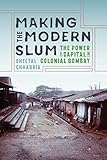Making the modern slum : the power of capital in colonial Bombay / Sheetal Chhabria.
By: Chhabria, Sheetal.
Contributor(s): Kaimal, Padma [series editor] | Sivaramakrishnan, K [series editor] | Yang, Anand A [series editor].
Series: Global South Asia. Language: eng.Publisher: Seattle : University of Washington Press, 2019Description: xi, 235 p. : b&w ill.., 5 maps, 4 tables ; 23 cm.ISBN: 9780295746272.Subject(s): Slums -- India -- Mumbai -- History | Urbanization -- India -- Mumbai -- History | Agriculture -- Economic aspects -- India -- Mumbai | Migrant labor -- India -- Mumbai -- History | Working class -- India -- Mumbai -- History | Capitalism -- India -- Mumbai -- History | Mumbai (India) -- Economic conditions | Mumbai (India) -- Colonization | India -- MumbaiDDC classification: 954.7923 Summary: In the late nineteenth and early twentieth centuries, Bombay was beset by crises such as famine and plague. Yet, rather than halting the flow of capital, these crises served to secure it. In colonial Bombay, capitalists and governors, Indian and British alike, used moments of crisis to justify interventions that delimited the city as a distinct object and progressively excluded laborers and migrants from it. Town planners, financiers, and property developers joined forces to secure the city as a space for commerce and encoded shelter types as legitimate or illegitimate. By the early twentieth century, the slum emerged as a particularly useful category of stigmatization that would animate city-making projects in subsequent decades. Sheetal Chhabria locates the origins of Bombay’s now infamous “slum problem” in the broader histories of colonialism and capitalism. She not only challenges assumptions about colonial urbanization and cities in the global south, but also provides a new analytical approach to urban history. Making the Modern Slum shows how the wellbeing of the city–rather than of its people–became an increasingly urgent goal of government, positioning agrarian distress, famished migrants, and the laboring poor as threats to be contained or excluded.| Item type | Current location | Call number | Status | Date due | Barcode |
|---|---|---|---|---|---|
 Book
Book
|
Prime Ministers Museum and Library | 954.7923 Q9 (Browse shelf) | Available | 189077 |
Browsing Prime Ministers Museum and Library Shelves Close shelf browser

|
No cover image available |

|

|

|
No cover image available | No cover image available | ||
| 954.792 R1 Bajorao Peshwa : | 954.7923 C3;D0 Bombay and Western India : | 954.7923 Q9 Bombay before Mumbai : | 954.7923 Q9 Making the modern slum : | 954.79245 fN3 Nagaur : | 954.794 fQ9 Daman & Diu : | 954.798 152R1 Goa Mukti Sangarsh / |
Includes bibliographical references and index.
In the late nineteenth and early twentieth centuries, Bombay was beset by crises such as famine and plague. Yet, rather than halting the flow of capital, these crises served to secure it. In colonial Bombay, capitalists and governors, Indian and British alike, used moments of crisis to justify interventions that delimited the city as a distinct object and progressively excluded laborers and migrants from it. Town planners, financiers, and property developers joined forces to secure the city as a space for commerce and encoded shelter types as legitimate or illegitimate. By the early twentieth century, the slum emerged as a particularly useful category of stigmatization that would animate city-making projects in subsequent decades.
Sheetal Chhabria locates the origins of Bombay’s now infamous “slum problem” in the broader histories of colonialism and capitalism. She not only challenges assumptions about colonial urbanization and cities in the global south, but also provides a new analytical approach to urban history. Making the Modern Slum shows how the wellbeing of the city–rather than of its people–became an increasingly urgent goal of government, positioning agrarian distress, famished migrants, and the laboring poor as threats to be contained or excluded.


There are no comments for this item.